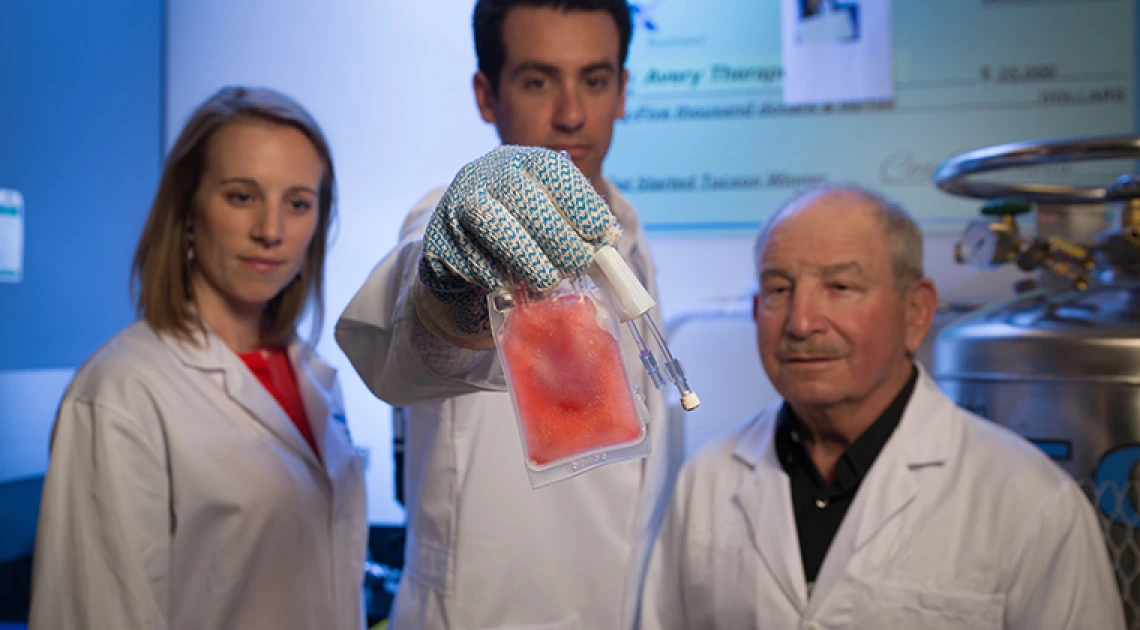Startup Commercializes Beating Heart Graft Invented at University of Arizona

Tucson, Ariz. – Local startup Avery Therapeutics, Inc., has licensed a beating heart graft technology invented at the University of Arizona College of Medicine-Tucson. Pre-clinical studies have already shown that the technology, called MyCardia™, improves heart function.
The inventors – Steve Goldman, M.D., professor of medicine at the University of Arizona Sarver Heart Center, and Jordan Lancaster, Ph.D., who earned his doctorate in physiology from the College of Medicine-Tucson – serve as the company’s chief medical and chief science officers, respectively. The Avery leadership team also includes Jen Koevary, Ph.D., chief operating officer, who earned her doctorate in biomedical engineering from the UA.
Tech Launch Arizona (TLA), the office of the UA that commercializes inventions stemming from University research, facilitated the process of defining and protecting the heart graft technology. TLA also provided asset development funding, as well as business development guidance as the company moved toward completing the license for the University-sourced technology.
The technology itself is a biologically active cardiac graft, a treatment for chronic heart failure (CHF) composed of three parts: 1) human neonatal dermal fibroblasts, 2) human induced pluripotent stem cells derived cardiomyocytes (hiPSC-CMs), and 3) a bioabsorbable scaffold. The beating graft can be surgically affixed to the heart to assist function.
“We have developed a tissue-engineered heart graft for treating patients with heart failure, which utilizes Nobel Prize-winning induced pluripotent stem cell technology,” said Dr. Lancaster. “Our heart graft will be pre-made, cryopreserved and ready for implantation. Ultimately this technology has the ability to offset the burden of patients needing heart transplant.”
According to Tod McCauley, TLA licensing manager who worked with the team to commercialize the technology, “The innovative cell-based approach that is the foundation of the technology licensed to Avery offers a promising alternative treatment for chronic heart failure patients, with the ability to regenerate function in damaged tissues.”
Co-inventor Dr. Goldman said, “This is some of the most exciting work that has come out of our laboratory and has the possibility to being a game changer in the care of patients with heart failure.”
The Avery team and the beating heart graft technology are already experiencing success, having garnered a Phase 1 Small Business Innovation Research (SBIR) award of almost $500,000 from the National Institutes of Health (NIH), a $750,000 award from the Arizona Biomedical Research Commission, as well as $60,000 in cash and prizes at Tucson’s Get Started pitch competition in October 2016. They also delivered their pitch at the Falling Walls Venture conference on “breakthroughs in science and society” in Berlin, Germany, in November 2016.
TLA team member and Mentor-in-Residence Bruce Burgess has been an invaluable advisor to the Avery team, bringing over 30 years of entrepreneurial experience in medical devices, diagnostics and drug delivery.
“The magnitude of these awards underscores the significance and potential of Avery's novel approach for chronic heart failure treatment,” Burgess said. “Numerous advancements in the management of CHF have been made in recent decades which reduce mortality and help to alleviate morbidity. Until now, there have been no advancements which reverse the course of this debilitating disease.”
Chronic heart failure is a leading cause of morbidity and mortality worldwide with over 600,000 new cases annually in the United States alone. Although current medical treatments decrease mortality from CHF, they do not reverse the disease process or restore long-term cardiac function, thus quality of life for patients tends to be poor.

